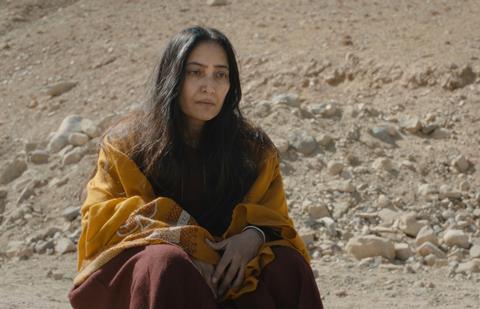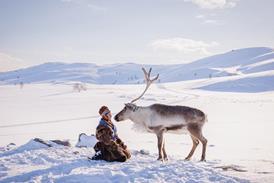Praveen Morchhale’s fifth feature is based on a real incident and makes its debut in Goa’s Indian Panorama

Dir: Praveen Morchhale. India. 2025. 81mins
After her filmmaker son is jailed for showing a short film that a local religious leader deems immoral, his supportive mother loads up her trusty yak and goes on a road trip to screen the film across Himalayan Kashmir. Based on a real incident from the Muslim-dominated region, writer, producer and director Praveen Morchhale’s White Snow is a minor key but deceptively powerful dissection of the unholy links between church, state, institutionalised misogyny and class disparity. Morchhale deploys a mostly light touch in a film that’s also timely in its depiction of why artists are the first target when there is a social narrative to be controlled.
Just the right balance of resignation and rage
As he did in Walking With The Wind (2017) and Widow of Silence (2018), Morchhale fundamentally trades in issues of empowerment and, in his fifth feature, he doesn’t stray far from the subject – or far from his preferred location in Kashmir. The director has been a mainstay on the festival circuit since his 2015 debut Barefoot To Goa, and the unfettered and accessible filmmaking here should secure White Snow continued festival play following its Goa premiere. As a film about finding roads to audiences, an art house release isn’t out of the question. The rugged beauty of the thorny Kashmir deserves space in theatres, but the intimate story will also translate to specialty streaming.
White Snow begins with budding director Ameer (Bhavya Khurana) getting his short film, also called ‘White Snow’, banned from any public screening on the day of its premiere. The film about his fraught birth on a snowy road in a jeep shows postpartum blood; a local religious leader, the Moulvi (Kachoo Ahmad Khan), decides that is immoral, and that images of afterbirth are a guaranteed precursor to revolution. After an official sanction, Ameer faces persistent harassment, physical threats, communications blackouts on Instagram and mobile phone services and, finally, arrest and jail.
Unwilling to stand by while Ameer is silenced, nor to stay silent herself, his mother Fatima (Madhu Kandhari) takes her yak Riri, laden with an old cathode Philips TV and a DVD player, to show the film in the rocky region’s far flung villages. Initially met with indifference, Fatima finally finds an audience that unfortunately has no electricity, and a second whose elder tells her to come back the next day; the one she has arrived on is too holy. Her mission does eventually succeed, however, even if it comes at a steep cost.
Morchhale once again calls upon Iranian cinematographer Mohammad Reza Jahanpanah (Walking With The Wind) to capture images that are the picture of tireless determination, most quietly chronicling Fatima’s trudge across the rubbly landscape with only the ring of Riri’s bell to keep her company. When she finally does find receptive ears, Ameer’s film resonates with the people Fatima appeals to (mostly women and younger individuals) who don’t want to be told what to watch, and who respond enthusiastically to seeing themselves on screen – putting an exclamation mark on Morchhale’s statements about the link between muzzling artistic expression and maintaining power.
Kandhari demonstrates just the right balance of resignation, rage and indignation to give White Snow’s closing frames their bittersweet impact, and end the film on the understated fiery note it needs.
Production companies: Barefoot Pictures
International sales: Barefoot Pictures, praveen@barefootpictures.co.in
Producer: Praveen Morchhale
Screenwriter: Praveen Morchhale
Cinematography: Mohammad Reza Jahanpanah
Production design: Akhilesh Kumar Dogne
Editor: Anthony Joseph
Music: Nalin Vinayak
Main cast: Madhu Kandhari, Bhavya Khurana, Kachoo Ahmad Khan, Kaneez Fatima
























